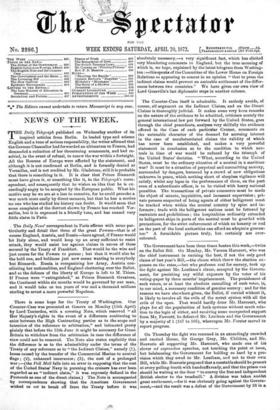There is some hope for the Treaty of Washington. Our
Counter-Case was presented at Geneva on Monday (15th April) by Lord Tenterden, with a covering Note, which reserved " all Her Majesty's rights in the event of a difference continuing to exist between the High Contracting parties as to the scope and intention of the reference to arbitration," and intimated pretty plainly that before the 15th June it might be necessary for Great Britain to withdraw from the arbitration in case the difference of view could not be removed. The Note also states explicitly that the difference is as to the admissibility under the terms of the Treaty of any reference as to " the Indirect Claims," namely (1), losses caused by the transfer of the Commercial Marine to neutral flags; (2), enhanced insurances; (3), the cost of a prolonged war ;—(the Pall Mall falls into an error in supposing that the cost of the United States' Navy in pursuing the cruisers has ever been regarded as an "indirect claim," it was expressly defined in the Protocols as one of the direct claims.) The Note is accompanied lay correspondence showing that the American Government wished us not to break off from the Treaty before it was absolutely necessary,—a very significant fact, which has elicited very blundering comments in England, but the true meaning of which is, we hope, explained by the latest telegram from Washing- ton :—this speaks of the Committee of the Lower House on Foreign Relations as appearing to concur in an opinion " that to press the indirect claims would prevent an amicable settlement of the differ- ences between two countries." We have given our own view of Lord Granville's last diplomatic steps in another column.


































